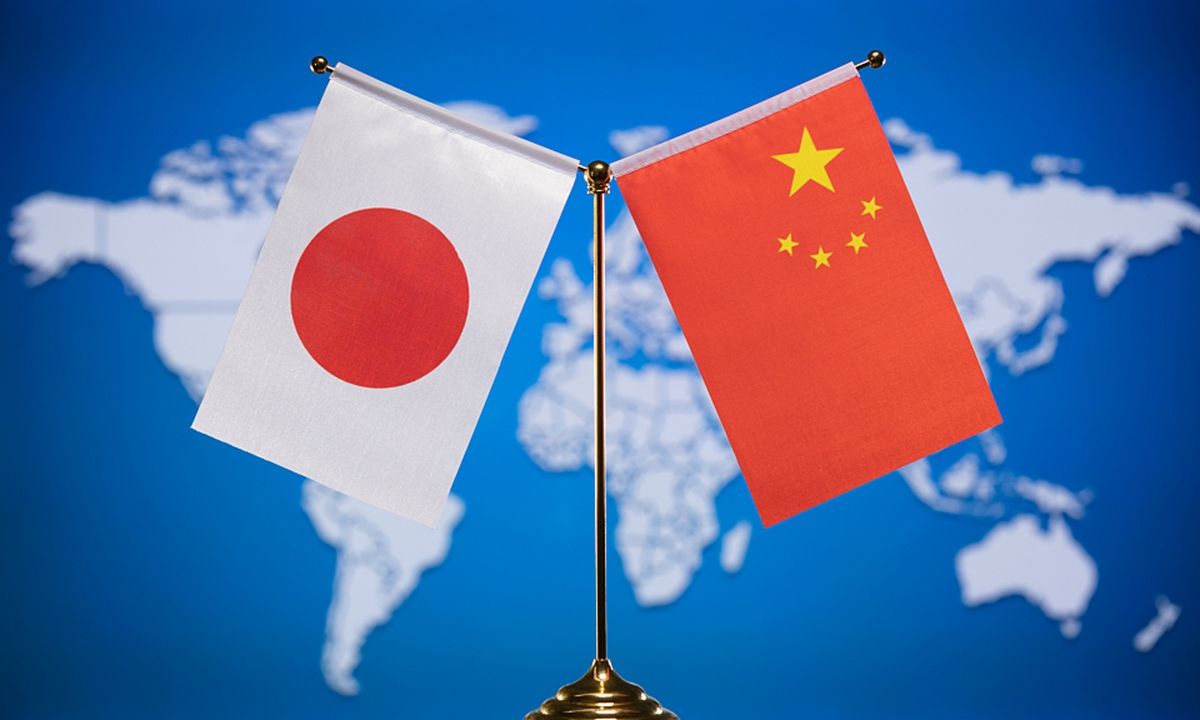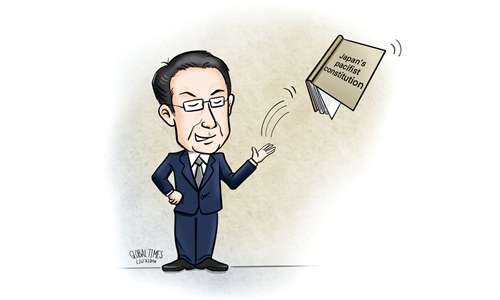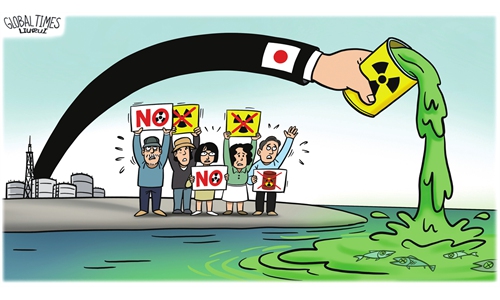
Photo: VCG
Editor's Note:China-Japan relations are currently in an abnormally chilly state. A series of negative diplomatic, military and economic moves by Japan have given China reasons to be concerned about possible regressions in Japan's policy toward China. Why did Japan's China policy substantially change? How should we view the reemergence of Japan's militarism? How should China cope with Japan's misguided China policy? At a symposium held on Friday in Beijing, three Chinese scholars shared their insights into these issues. The Global Times selected the opinions of the three experts.
Policy retrogression
Liu Jiangyong, professor at Institute of Modern International Relations at Tsinghua University
Japan's national security strategy has undergone significant adjustments and embarked on an extremely abnormal trajectory, which is not a temporary phenomenon. The new version of Japan's National Security Strategy and two other security policy documents, passed by the administration of Fumio Kishida in December last year marked a turning point.
The prominent aspects of Japan's new national security strategy include its strategic positioning toward China and the Taiwan island of China. China is identified as the "biggest strategic challenge to date" for Japan, while the Taiwan island is referred to as a "crucial partner and an important friend" that shares "basic values" with Japan. Based on this, Japan will take a series of follow-up actions. Japanese Prime Minister Kishida is reportedly planning to attend a NATO summit scheduled for July. That mirrors Japan's new trend in national security strategy.
Overall, Japan has severely destructed its strategic positioning toward China. In the past, it was believed that the main contradiction was between China and the US, and Japan was simply following the US. The reality is not so. In certain areas or issues, Japan is even leading the way, such as disputes over the Diaoyu Islands, where Tokyo requested the US to defend Japan. The concept of Indo-Pacific Strategy was first raised by Japan, and then the US made used of the idea and formulated the American version of the strategy.
Japan's economic growth in fiscal 2023 was forecasted to be 1.3 percent. But its new defense budget is 26 percent higher than that in previous year. There are reports that Germany will surpass Japan in terms of GDP growth this year. However, it is evident that Japan's defense expenditure exceeds that of Germany, which is a clear anomaly and quite rare during peacetime.
In addition, Japan continues to create and hype the "China threat theory," accusing China of wanting to "unilaterally change the status quo." For several decades after the war, Japan generally pursued a path of peaceful development, winning economic growth and international status through enhancing added values of products and expanding overseas markets. Given the current economic situation in Japan, it should continue to strengthen cooperation with China. However, at this time, the Japanese side, under the pretext of "economic security," goes against the general wishes of the Japanese business community and cooperates with the US in suppressing China's economy, trade, and technology. This includes the implementation of export controls on 23 categories of products, such as semiconductor manufacturing equipment, starting from July 23 this year. Such actions, which violate market principles and norms are clearly "abnormal."
The significant adjustment of Japan's national security strategy and its corresponding actions have severely damaged the political mutual trust between China and Japan. As the political relationship between the two countries continues to cool down, the economic relationship may also turn chilly, entering a state of "political coldness and economic coldness."
Lü Yaodong, deputy head of the Institute of Japanese Studies, Chinese Academy of Social Sciences
The revision and implementation of the three documents of Japan's national security strategy truly represent the most significant national strategic adjustment of Japan in recent years. Compared to the 2013 version, the adjustments and changes in Japan's newly revised national security strategy are extremely substantial, which can be described as a "qualitative change." The first major change is the mention of "counterstrike capability," also known as "enemy base strike capability." Japan's pacifist constitution stipulates that its military can only engage in "self-defense," meaning that all weapons and equipment are defensive in nature. However, Japan has now begun to openly purchase aggressive weapons such as the American Tomahawk cruise missiles in a big way. According to the new version of the national security strategy, this so-called "counterstrike capability" is actually offensive and allows for "preemptive strikes," which also clearly contradicts the pacifist constitution and exposes the essence of Japan's new national security strategy.
The second change is the inclusion of "economic security" in the national security strategy. When it comes to the aspect of China, it will mean a serious impact on China-Japan economic and trade exchanges. The Japanese side first considers "economic security," which is bound to have a negative impact and restrictive effect on China-Japan economic, trade and technological exchanges.
The third change is promoting Japan's own defense capability construction to a position above the Japan-US alliance. This leads to a contrast, that is, Japan's current stage of economic recovery is still full of uncertainty, while its defense expenditure is required to increase in the opposite direction to 2 percent of GDP.
The fourth is actively seeking the right to speak on and dominate the "Indo-Pacific" affairs. This also involves the issue mentioned earlier: is Japan's national security strategy and policy adjustment toward China due to pressure from the US? Obviously not. Japan has been, to a considerable extent, promoting and leading discussions on East Asian topics and creating disturbance. For example, using the "Ukraine crisis" to increase the clamor and hype on the Taiwan question, which is a way of calling on the US and West to "look East."
Guo Xiaobing, director of Arms Control Studies Center, China Institutes of Contemporary International Relations
To observe Japan's national security strategy and even the adjustment of its policy toward China, a nuclear perspective is also indispensable. Japan itself is a country with huge nuclear weapons potential. With Japan going forward on the nuclear issue, whether Japan will cross the nuclear threshold becomes an important issue.
Japan crossing the nuclear threshold mainly involves five aspects. The first one is the technical threshold, which is very low for Japan. The second is the material threshold. As a major nuclear power, Japan deliberately hoards a large amount of fissile materials.
The third is payload capacity. In this regard, Japan has advanced space launch technology, and its solid rocket technology ranks among the top in the world. The fourth is the political threshold. Japan's development of nuclear weapons is now facing strong domestic public opposition. However, the hype of the Japanese right wing is growing louder. The risk of Japan abandoning the "three non-nuclear principles," breaking the bottom line of nuclear non-proliferation and acquiring nuclear weapons is increasing. The fifth is the diplomatic threshold. The main constraint for Japan to cross the nuclear threshold is the opposition of the US. But as Japan's right-wing forces intensify their hype on issues such as "nuclear sharing," the US may loosen this "shackle" on Japan in order to maintain its hegemony.
From any perspective, it would be a dangerous and foolish choice for Japan to cross the nuclear threshold. However, as Japan's internal affairs and diplomacy become more right-leaning, the possibility of Japan making such a decision cannot be ruled out.
Militarism reemerges
Liu Jiangyong:
Militarism is a specialized term that primarily refers to Japan's past militarization of the entire national economy under the Meiji Constitution, continuous aggression and expansion abroad, and the corresponding ideological system, which collectively constitute a form of militarism. Currently, Japan's national strategy has indeed deviated, but as of now, I don't think it will return to pre-war militarism. One important criterion for this judgment is that the Pacifist Constitution still exists.
The underlying logic behind Japan's continuous military buildup is not to immediately launch a military action against China, but to seek more deterrence against China. Since its own deterrence is limited, it is ganging up with the US and other countries which share the so-called same values with Japan. Boosting US-Japan-South Korea security cooperation and Quad are examples.
Lü Yaodong:
Militarism can be understood from two perspectives: ideology and institutions. In general, it refers to a state's political, economic, social, and cultural aspects being subordinate to and serving the purpose of launching aggressions abroad. Looking at the current situation in Japan, this militarism is still restricted by the existing "pacifist constitution" in terms of institutions. The US formulated this constitution for Japan after World War II in order to eliminate the "militarism" root from its institutions. However, in practical terms, the remnant of militarism still exists in Japan. After all, as an ideology, it is difficult to completely eliminate it through institutional means.
Wrong policy
Liu Jiangyong:
We can stabilize China-Japan relations through properly distancing Japan in attitude and actions, while enhancing our own charm and improving problem-solving skills. We can increase investment and economic cooperation with some European countries and countries along the Belt and Road Initiative. When doing so, we may trigger Japan to reflect on its anti-China hypes, realize its deeds could ultimately backfire and cause them to miss another wave of dividends from China's deepening of opening-up and strengthening of international multilateral cooperation.



